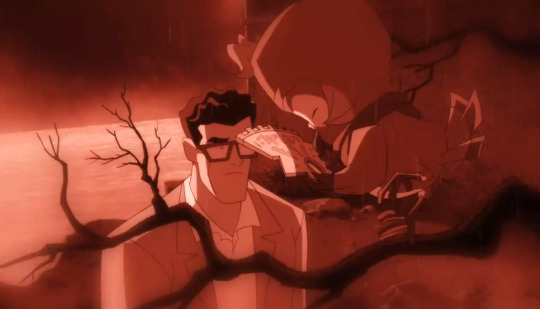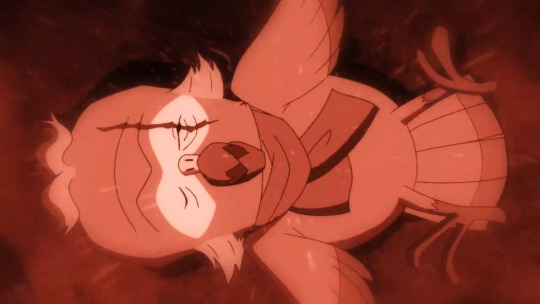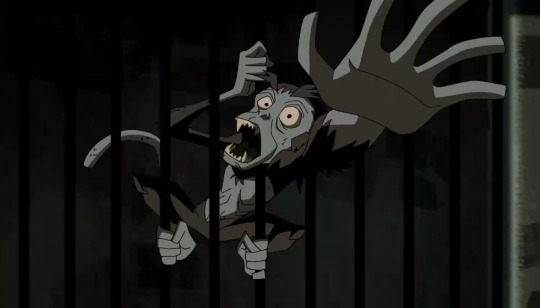#professor pericles energy
Text

Me & my little brother just finished up our nearly annual summer re-watch of Scooby Doo: mystery inc. :)
#scooby doo mystery incorporated#princess is def more evil in that universe#professor pericles energy#doodle#self insert ocs fr :)
5 notes
·
View notes
Text
[cws: starvation/food insecurity, fantasy racism, psychiatric abuse, ableism, and Upsetting Pictures.]
-
one thing that fucks me up immensely about pericles before and after the asylum is how fucking skinny he is.
like. as much as obviously the two designs are Very Inconsistent in general which annoys me, look at him pre-timeskip. look at how he's shaped.




his head and face are way smoother and rounder, both in front and back, and the space between his cheekbones and his eyebrow ridge is filled in; his body is rounder in general and his belly is noticeably between his thighs when he's standing up; he has kind of a chubby butt; his chin and neck are softer and wider around, which you can really see with the width of the scarf compared to his shoulders and the angle where it meets his head. it comes up in front of his face more because there's not as much of an angle with his chin to hold it down.
now. compare all those things to this.




christ.
and like, you could argue some of these design differences are tiny things to zero in on in a show that's as loose with its models as sdmi is. but present-day pericles' design is pretty obviously supposed to be unsettling because he's physically built to be a Cute Roumb Little Mascot Creature--so much so that the framework has managed to stick around a little in spite of everything--and has become gaunt and haggard anyway. and you could also argue that the body type changes are just thanks to aging twenty years (and i don't doubt that's contributed).
except. he spent those twenty years in an asylum where the other inmates we see look like this.


christ.
(fun little fact that @thecottageinthedark pointed out also: remember how he literally got caught at one point because he couldn't stop eating sunflower seeds, even during a heist? a high-fat, high-calorie snack for birds? you know, exactly the kind of thing a starving person who finally has proper access to food would be wolfing down?)
(yeah.)
did i mention that this happened in a (fantasy) racially segregated prison, which is technically an asylum so the inmates can be kept there indefinitely, because in an actual prison you're required to have a sentence? did i mention that none of the human characters we see in human prison look any less healthy during or afterward, and on top of that are allowed to move around and socialize? did i mention the absolutely horrific treatment of the asylum inmates is implied to be despite the fact that the (physically abusive!) guard is playing up how dangerous and malicious they are? (you know. except for pericles 🙃)
did i mention the man who got pericles imprisoned--who he had not only done nothing to beforehand, but had helped--says he was there to 'live out the rest of his miserable parrot life in a cage, where he belonged,' and not only do none of the characters we're supposed to side with have anything to say about that, but the audience is clearly supposed to agree with him too?
(did i mention said man--who was in on the crime, singular, that pericles went to prison for!--spends those twenty years living a life of luxury in power while abusing the child he kidnapped as a baby and held hostage his entire life, and when we see him in prison he is not only chilling out and helping the authorities but reading a newspaper?)
did i mention the part where by the time we meet pericles he hasn't spoken in years?
like. man the 'ooooo scary evil abused asylum crazies' trope is bad enough, even when they pretend to lampshade it for a minute before playing it straight; i don't know how they added in All That and made him emaciated and expected no one to find it heartbreaking or even sympathetic. i don't care how bad he was before the asylum (and dear god was he ever), that is horrifying and no one deserves it. god damn.
#sdmi#professor pericles#scooby doo: mystery incorporated#the worldbuilding re: the talking animals in this universe is already really fucked up and awful#but everything to do with the asylum is one of the biggest things for me that shoves it over the edge from#'this aspect of the show is really disasteful and uncomfortable and i Don't Like It'#to 'wow this is actually really fucking upsetting i am straight up having to skip past scenes and/or take breaks when a detail comes up'#anyway pericles is a colossal piece of shit and also incredibly fucking tragic and i need more content that acknowledges and goes into that#and also due to Recent and Ongoing Life Experiences i am especially pissed these days about#'character loses a ton of weight and looks Haggard compared to before; because of that and in general' being associated with Evil Scary#especially when it's done to them in some way as *punishment* for being Evil#same energy as how badly it fucked me up as a kid to grow up constantly seeing#'villain has a horrifying spiraling mental breakdown because they're Pathetic and Evil'#in every fucking piece of media i engaged with!#anyway lol#the crit files#SDMItag#cws in post
18 notes
·
View notes
Text
3 notes
·
View notes
Text
“In July 1820, G. W. F. Hegel and his students arrived in Dresden to see some of the city’s art. The year was not an auspicious one for liberal or revolutionary circles.
Napoleon’s armies disbanded, Europe’s reactionary powers restored the old order through the Holy Alliance. With police spies snooping around, positive sentiments for the French Revolution and the ghosts of progress were seldom exhibited. Such sentiments were forced underground by reaction, and to even speak favorably about the revolution in public or in official circles would be near-lunacy. That’s why in the case of Hegel — someone described as a Prussian-state philosopher — the scene Terry Pinkard describes is remarkable.
Hegel gathered friends and colleagues and ordered top-shelf champagne — Champagne Sillery, the most distinguished of its day. He passed bottles around the table, but “when it became clear that nobody at the table knew exactly why they should be drinking to that particular day, Hegel turned in mock astonishment and with raised voice declared, ‘This glass is for the 14th of July, 1789 — to the storming of the Bastille.’”
Needless to say, this toast astonished the students there, among them Eduard Gans, who would later become Marx’s law professor. How could Hegel be so reckless to express such dangerous sympathies at the height of Restoration Europe?
Hegel once told his friend Immanuel Niethammer that to be a philosopher was to be an “expositus,” an exposed person. Once the French Revolution rediscovered that Nous, reason, governs the world, Hegel, the philosopher of reason, would inevitably find himself — whether he liked it or not as a Prussian state philosophy professor — allied to those progressive and potentially rebellious forces. The philosophy of absolute reason thus had real political consequences.
The French Revolution decisively shaped Hegel’s life and thought. One of the first anecdotes we have from Hegel’s student days at the Tubingen seminary is how he and his student-friends, Holderlin and Schelling, planted a “Liberty Tree” together on July 14, 1793, when the Jacobin terror was at its peak. They danced and sang revolutionary songs around it, anticipating that the new revolutionary dawn would soon come to Germany.
Even more than planting a revolutionary maypole, Hegel was a member of the Jacobin Club in Tubingen. That experience inspired him to write subversive passages in his “Historical Fragments” collected by Karl Rosenkranz from Hegel’s Bern Period (1793–1797). Here are some excerpts:
How dangerous the disproportionate wealth of certain citizens is to even the freest form of constitution and how it is capable of destroying liberty itself is shown by history in the example of Pericles of Athens; of the patricians in Rome, the downfall of whom the menacing influence of the Gracchi and others in vain sought to retard through proposals of agrarian laws…
It would be an important topic of investigation to see how much of the strict right of property would have to be sacrificed for the sake of a durable form of republic. We have perhaps not done justice to the system of sansculottism in France in seeking the source of its demand for greater equality of property solely in rapacity.
We also find this passage preserved in the historical studies, which may be an instance of Hegel’s early Jacobin oratory, addressed to a reactionary defender of the status quo against the unleashed revolutionary energies of the people:
There is a great difference between the passivity of military subordination (under a monarchy) and the rage of insurrection; between the order of a general and the flame of enthusiasm which liberty establishes through all the veins of a living being. It is this sacred flame which strained all nerves; it is for this flame, it is to enjoy it, that they exerted themselves. These efforts are enjoyments of liberty, and you wish the people to renounce them. These activities, this endeavor on behalf of the public, this interest is the active principle, and you wish the people to throw itself more into inaction and torpor.
After the Reign of Terror and the fall of Robespierre, Hegel took a more somber and often times very critical view of Jacobinism in his later Jena period, right through to the publication of his masterwork, the Phenomenology of Spirit. But it is important to understand how Hegel understood the Jacobins’ role as not entirely retrogressive, but progressive to the development of human freedom, or what Hegel calls the development of human spirit in history.
Hegel’s critique of the Terror was more salutary towards the Jacobins than mainstream scholars give credit for. According to some, Hegel took a counterrevolutionary position, almost similar to that of Edmund Burke. Against this reductionist view, we need to revisit the points Hegel’s Jena writings and lectures from 1805–06.
Hegel is clear in these works that in order for the idea of freedom to become flesh, spirit requires force to create the conditions for freedom. As he puts it in his Jena Wastebook Aphorisms: “Through consciousness (rational) spirit intervenes in the order of the world. This is spirit’s infinite tool, also bayonets, cannons, and bodies.”
Hegel thought that spirit — the activity of human beings becoming conscious of their freedom — had to actualize itself in history. But not all conditions for its actualization are ripe. That is, not all conditions are revolutionary ones. When the matter at hand is ripe, there is an imperative to manifest the interests of spirit as an objective historical fact.
The freedom of spirit is, for Hegel, embodied in the rational unity of a people. But universal freedom does not come from thin air. It has to “gather itself into this unity.” It has first to constitute itself “as a universal will, out of the will of individuals.”
Yet the people’s will is not always transparent to itself. In other words, to use Hegel’s language, it may still be trapped in “its immediacy.” The creation of the state thus presupposes the overcoming of this immediacy, and historically it is overcome through war and revolutionary dictatorship. Thus, Hegel justifies in his Jena lectures emergency measures and dictatorship amid the domestic and international threats revolutionary France faced.
It was, for Hegel, the fearful force of the French revolutionaries that “sustained the state [and] the totality, in general.” Rather than the capricious and arbitrary exercise of despotic power, the French revolutionary dictatorship was what Hegel called a tyranny of “pure frightening domination.” Or, in the words of Robespierre and Saint Just: terror. For Hegel this domination was a “necessary and just” one, since “it constitutes and sustains the state as this actual individual.”
However, Jacobin tyranny soon becomes superfluous according to Hegel: it loses its attachment to the needs of its time and becomes terroristic in the bad sense, transforming into a terror unhinged from historical necessity. Hegel’s account here is in accord with the speculative logic of the revolution in the Phenomenology of Spirit: that the voluntaristic aspects of the Jacobin regime became a night of suspicion and death.
But it would be a mistake to think that Hegel’s criticisms are from the Right. Hegel recognizes the necessity of the moment of “Absolute Freedom and Terror” in the Phenomenology as part of the development of human freedom and it is important to see how Hegel understands the necessity of Robespierre himself.
Once the people are defended against counterrevolution, and the necessary — but progressive — tyrant institutes an education process for the people, his existence is replaced by the rule of law. “Through obedience (to the rational will), the law itself is no longer an alien force, but rather the known universal will.”
People may find tyranny abhorrent or morally repugnant, but the actual reason tyranny is overthrown is not because it is evil, but because it is no longer necessary for the development of human freedom. According to Hegel, Robespierre fell not because he was evil, but “because necessity had left him, and thus he was overthrown by force.” In a rather enigmatic passage, Hegel claims that “the necessary (the fall of tyranny) happens — but every portion of necessity is usually allotted only to individuals. The one is accuser and defender, the other a judge, the third a hangman but all are necessary.”
In the defense of a rational tyranny, it is important to notice the emancipatory telos Hegel ascribes to it. Its exercise is meant to be temporary, helping to sustain and protect progressive forces and tendencies. Hence, the stark opposition between dictatorship and freedom dissolves, as the former helps to foster the latter.
The Jacobins can be appreciated as an expression of a real historical movement to overcome the irrationality of feudalism. They relied on popular forces for their power, helping to shape those forces in turn. Hegel acknowledged the need for plebian revolutionary methods also in the case of the Gracchi brothers in their struggle against the Roman patricians. And even if Hegel never wrote explicitly on the Haitian revolution, Hegel positively acknowledges the “free and Christian republic” of Haiti, established through a black Jacobin slave revolt.
Hegel acknowledges in his last essay on the English Reform Bill that the Jacobin constitution of 1793 was the most democratic document the world had ever seen. But it remained only a piece of paper. Compared with the sublime ideas and rhetoric of the democratic Jacobins, the interests of the revolution had to develop in a more prosaic manner.
However, with the advent of Bonapartism, this prose was written in the style of dictatorship and war. Hegel may have criticized the Jacobins for their excesses, and how those excesses grew as a result of their lack of historical efficacy. But at the time he wrote the Phenomenology of Spirit, Hegel was supporting the armies of Bonaparte as they tore through Europe. When Hegel wrote pro-Bonapartist propaganda as a newspaper editor in Bamberg, he was — to use a Leninist expression — a revolutionary defeatist. He wanted his home government to lose and be reshaped by the French.”
- Harrison Fluss, “Hegel on Bastille Day.” Jacobin. July 14, 2020.
#g. w. f. hegel#phenomenology of spirit#french revolution#bastille day#jacobins#jacobinism#revolutionary spirit#fête nationale française#le 14 juillet#révolution française#l'esprit du 14 juillet#spirit of july 14
0 notes
Text
sometime i need to just make an audio compilation of pericles lines and the extraordinarily horny way he says them, because like it's just really really good voice acting in general but also some of them make my soul lift out of my body every time. words cannot do it justice. if i have to have this in my neurons forever so do you
#sdmi#scooby doo: mystery incorporated#professor pericles#his VA is legendary in indie horror film circles for being Big Gay Sexy and it's so fucking funny to me how hard he brought that energy here#there are few things that bring me more joy than when somebody watches sdmi for the first time on my recommendation#and their liveblogging it to me increasingly turns into NO WHY DID YOU DO THIS TO ME. OH MY GOD#he doesn't get everyone but when he does it makes me fucking cackle every time#the best part bar none is watching them lose their fucking minds at the tentacle scene#[john mulaney voice] now YOU know what it's like to live in my brain#the creators setting out to make the goofy-looking cartoon parrot villain uncomfortably hot was power move of the century#i'll give them that much#shitposting#SDMItag#mild nsft
7 notes
·
View notes
Text
i love sdmi very dearly and for a lot of reasons it is very important to me, but all the other 'good fucking god what year is this' stuff aside the worldbuilding re: the talking animals is so deeply fucked that it is genuinely really upsetting to me to think about that bit for long lmao
#sdmi#scooby doo mystery incorporated#SDMItag#professor pericles#who i am tagging here because it is very fun to be extremely invested in a character whose experiences with this are fundamental lol#genuinely i have to meta at it in doses because internal horror screaming#it's supposed to be Goofy Silly Talking Animal World You're Not Supposed to Think About Too Much and it just makes it that much worse#relatedly love him or hate him if you call pericles a nazi i am destroying you with my eye beams#which i will be writing up Posts about later if i have the energy but deadass i will block you. fuck off#it's always the fuckin antis too lmao#anyway#racism cw#nazi mention cw#the crit files#the salt files#anti mention cw
3 notes
·
View notes